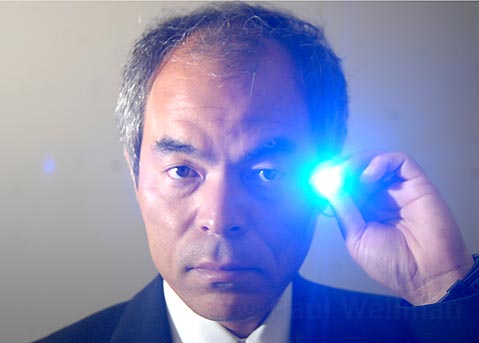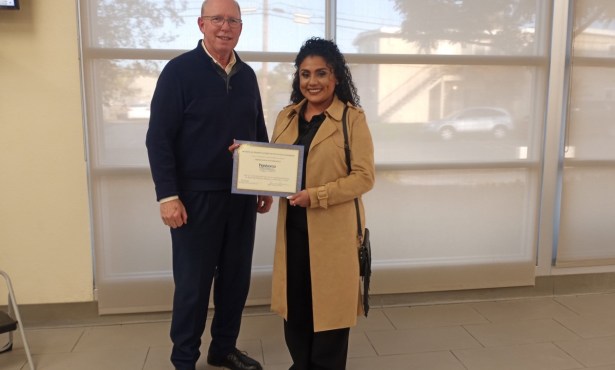UCSB Professor Shuji Nakamura Wins Nobel
Invention of Blue LEDs Paved the Way for Low-Cost, Energy-Efficient Lights

UC Santa Barbara professor Shuji Nakamura has been awarded the 2014 Nobel Prize in Physics for “the invention of efficient blue light-emitting diodes, which has enabled bright and energy-saving white light sources,” the Royal Swedish Academy of Sciences announced Tuesday morning.
Nakamura became the sixth UCSB faculty member to win a Nobel Prize, and he shares this year’s award with Japanese scientists Isamu Akasaki and Hiroshi Amano. While red and green LEDs had been around for some time when the three first produced blue light beams from their semi-conductors in the early 1990s, the third color of diode finally allowed for the creation of white light. “They succeeded where everyone else had failed,” the academy said.
Now, the white LED lamp “holds great promise for increasing the quality of life for over 1.5 billion people around the world who lack access to electricity grids,” the academy explained in its announcement. “Due to low-power requirements, it can be powered by cheap local solar power.” About one-fourth of world electricity consumption is used for lighting purposes; LEDs last up to 100,000 hours, compared to 1,000 for incandescent bulbs and 10,000 hours for fluorescent lights. “Incandescent lightbulbs lit the 20th century; the 21st century will be lit by LED lamps,” the academy said.
Nakamura was born in 1954 in Ehime, Japan, and he completed his bachelor’s, master’s, and doctoral degrees in electrical engineering from the University of Tokushima, Japan. He joined UCSB’s faculty in 2000 and is codirector of its Solid State Lighting & Energy Electronics Center. Over the years, he’s pioneered a number of advancements, like his development of semiconducting technology using gallium nitrides and his breakthrough work on light emitters.
“It is very satisfying to see that my dream of LED lighting has become a reality,” Nakamura said in a UCSB press statement. “I hope that energy-efficient LED lightbulbs will help reduce energy use and lower the cost of lighting worldwide.”
“Dr. Nakamura has helped to pioneer a scientific revolution in solid-state lighting, with far-reaching impact on fields ranging from information and communication, to energy and the environment, to health care and life sciences,” said UCSB Chancellor Henry Yang in the same statement. “By making it possible to bring affordable, energy-efficient LED lighting to developing countries, Professor Nakamura has also made a tremendous humanitarian contribution to our world.”
Rod Alferness, dean of UCSB’s College of Engineering, said, “Dr. Nakamura’s achievements in solid-state lighting continue to have far-reaching impact on lighting and computing technology. We all have his pioneering research to thank for the LED lightbulb, monitors, mobile devices, and large flat-screen displays that we enjoy today.”
“Add Shuji Nakamura to the distinguished faculty at UCSB who have won the Nobel Prize,” Congressmember Lois Capps said on Tuesday. “I am so proud of Dr. Nakamura for his work, which shows once again that UCSB is a premier university at the cutting edge of groundbreaking research. I congratulate Dr. Nakamura and his counterparts at Nagoya University in Japan and look forward to seeing where his invention and innovation leads our society.”
Nakamura, Akasaki, and Amano will split a prize of $1.1 million awarded in Stockholm on December 10. The Nobel award in chemistry will be announced Wednesday, followed by the literature award on Thursday and the Nobel Peace Prize on Friday. The economics prize will be announced next Monday.



